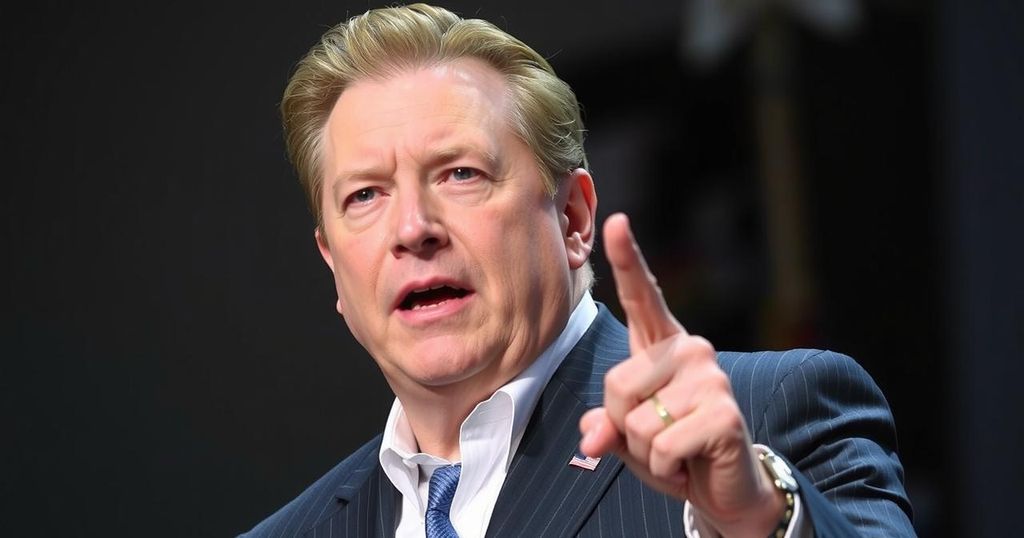The German government has accused Elon Musk of trying to influence the upcoming election by endorsing the far-right AfD party. Following his social media posts and an editorial supporting the party, officials warned of troubling foreign interference in domestic politics. The situation reflects broader concerns about the impact of significant external figures on national elections and democratic processes, particularly amid Germany’s existing political instability.
The German government has accused entrepreneur Elon Musk of attempting to influence the nation’s election process by endorsing the far-right party Alternative für Deutschland (AfD). At a recent media briefing, government spokesperson Christiane Hoffmann stated, “It is indeed the case that Elon Musk is trying to influence the federal election,” following Musk’s social media posts and an opinion piece supporting anti-immigration sentiments. While Hoffmann acknowledged Musk’s right to free speech, she emphasized that such freedom includes the expression of “the greatest nonsense.”
Musk has a history of engaging with German political discourse, labeling Chancellor Olaf Scholz as a “fool” last month. However, his recent promotion of the AfD, labeled by federal authorities as an extremist party, has prompted significant backlash and raised concerns regarding foreign interference in German politics. In a recent X post, Musk stated, “Only the AfD can save Germany,” amplifying the party’s message through a video shared from rightwing influencer Naomi Seibt.
The situation escalated when Musk published an editorial in Welt am Sonntag, asserting that Germany faces economic and cultural decline, while defending the AfD against radicalism accusations and commending their fiscal policies. This editorial sparked outrage, leading to the resignation of Eva Marie Kogel, the opinion section editor, who protested the decision to publish it.
Political leaders from various parties expressed alarm over Musk’s involvement. Health Minister Karl Lauterbach criticized his actions as “undignified and highly problematic,” while Friedrich Merz remarked on the unprecedented nature of such interference in a friendly nation’s electoral process. Having faced instability with his coalition, Chancellor Scholz now anticipates a general election amid growing concerns over the economy and potential voter dissatisfaction.
This political turmoil coincided with President Frank-Walter Steinmeier’s warning of “outside influence” during a speech coinciding with his decision to dissolve parliament, implicitly addressing Musk’s role. Despite the mainstream parties’ consensus to avoid collaboration with AfD, the party is currently polling second, complicating potential coalition scenarios following the upcoming elections. Furthermore, AfD leaders have made efforts to establish connections with the Trump administration, indicating a broader intersection of international political dynamics.
The controversy surrounding Elon Musk’s comments arises against a backdrop of significant political upheaval in Germany. As the country braces for an early general election due to the collapse of Chancellor Olaf Scholz’s coalition, allegations of foreign interference in its democratic processes have intensified. The Alternative für Deutschland (AfD), which Musk supports, has garnered considerable attention for its extremist positions and challenges to traditional party structures. This scenario highlights the complexities of modern political discourse, where influential figures such as Musk can sway public opinion across borders, prompting concerns among local officials about the integrity of national elections.
In summary, Elon Musk stands accused of attempting to influence the German election by endorsing the far-right AfD party, thereby igniting significant backlash from political leaders and the broader public. The German government’s response underscores a deep concern regarding foreign interference in elections, especially in light of existing political instability. Such actions may complicate coalition negotiations post-election and reflect ongoing tensions within Germany’s political landscape. The intersection of international politics and social media continues to raise vital questions about democratic integrity in a global context.
Original Source: www.theguardian.com






